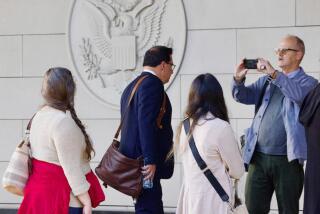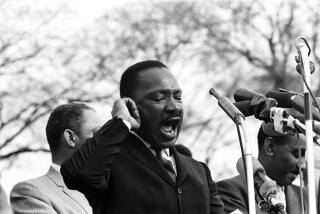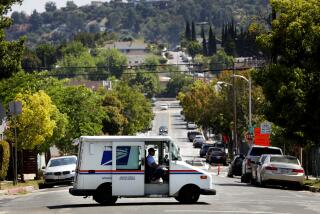We stood up, and it mattered
It’s a bit startling to realize that it has been 40 years this week since I participated in a watershed event in the political life of East Los Angeles. The 1968 Chicano student walkouts took a stand against discrimination against Mexican Americans. They gave a community hope for promised change -- change that, regrettably, hasn’t fully come about.
The walkouts exploded after weeks of clandestine planning by high school students and some college students who had come back to their neighborhoods as activists. Some teachers called those college students “outside agitators” and even “dupes of the communists.” We high school students may have been naive, but we were nobody’s dupes. We had long been coerced by the school system into “knowing our place,” so it took courage to do what we did.
I remember that March morning clearly. It was gray and cloudy. All week long there had been whispered hints that there was going to be a walkout -- a kind of student strike to protest conditions that were plain enough for everyone to see: poorly maintained buildings with peeling paint and crumbling foundations; dilapidated classrooms with too many students and not enough desks.
“They don’t have to put up with this at schools on the Westside,” a friend of mine grumbled. Other problems were just as obvious -- to the careful observer -- and just as pernicious, such as teachers who referred to us as “lazy Mexicans” and “stupid wetbacks.”
We also wanted to protest the conditions that led to a dropout rate hovering around 45%. Barely half of us were making it out of high school. Something was desperately wrong, and we wanted to do something about it.
And so, before the clock struck 10 that morning, many students stood up to affirm their dignity and walked out of school. I was the editor of the student newspaper, “The Railsplitter,” at Lincoln High. Walking out and covering the event was my first Big Story. I marched alongside my fellow students with tape recorder and notebook in hand.
But walking out was also a personal decision, one I made after much thought. I didn’t see myself as a lawbreaker. But I also felt the cause was important, so I disobeyed the teachers who urged me to stay put, to stay on campus.
Nearly all the protesters were Chicano -- brainiacs, jocks, cheerleaders, nerds and gangbangers, all marching together. I remember the bell bottoms and the wildly colorful paisley shirts, alongside the skintight polyester A-1 Racers and madras shirts. There were starched khakis topped by straight-cut Sir Guy shirts -- shirts that looked like dark dentist’s smocks, only less fashionable.
I remember beehive hairdos next to hippie straight tresses, next to is-that-a-girl-or-a-boy shaggy hairstyles. There were a few diehard, slicked-back cabezas on guys who seemed determined to look like their ducktail-sporting older brothers of the late 1950s and early ‘60s.
Beyond the visual memories, I think it was a transformative experience for everyone who participated -- although we didn’t necessarily know it at the time.
On a personal level, I went from being someone who always wanted to play by the rules, get good grades and not make waves to someone who realized it was necessary, even noble, to challenge authority sometimes. I gained a pride in my heritage that made me more comfortable with who I was -- a young man whose parents were from Mexico. I overcame the shame that I used to feel as a kid when my mother “spoke funny” in public.
For the Mexican American community, emboldened by the stand the students took, the walkouts were a catalyst for future activism on all fronts -- from education to cultural expression to electoral politics. In 1968, there were four Mexican American members in Congress, and you could count the number in California’s Legislature on one hand. Today, according to the National Assn. of Latino Elected Officials, there are 5,129 Latinos in elected office, including, of course, the mayor of Los Angeles.
The protests in 1968 didn’t happen in a vacuum. They erupted within the turbulent caldron of activism that called for civil rights and an end to an unpopular war. In those times, I remember reading that “the best way to get the Man off your back is to stand up.” We stood up on that day.
Forty years ago, the Los Angeles school board was the Man. Today, it is an ally with the community in the effort to improve education. We have come very far in many ways, but we have a long way to go.
The dropout rate at my alma mater, Lincoln High School, and the other Eastside high schools is still about 45%.
Luís Torres, a broadcast news reporter for 25 years, is a Los Angeles writer.
More to Read
Start your day right
Sign up for Essential California for news, features and recommendations from the L.A. Times and beyond in your inbox six days a week.
You may occasionally receive promotional content from the Los Angeles Times.






